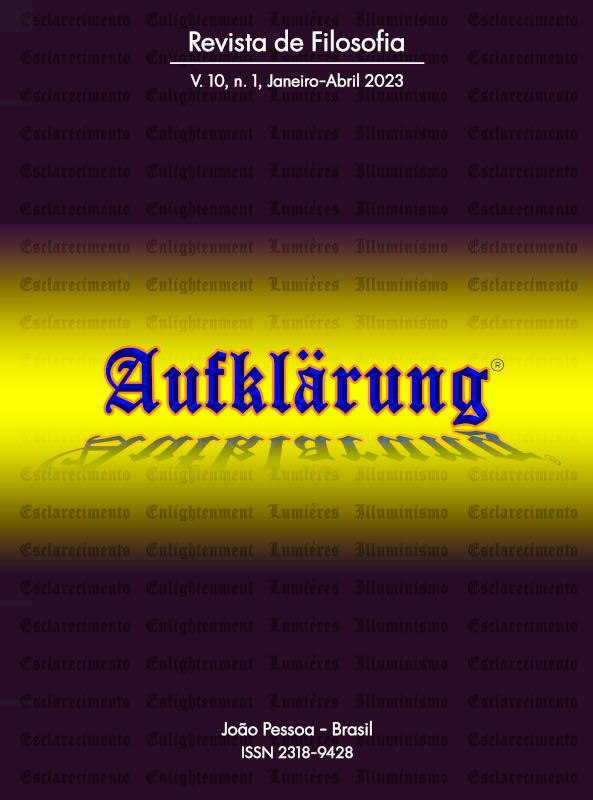A felicidade como função de valorização da vida humana, em Aristóteles
DOI:
https://doi.org/10.18012/arf.v10i1.67088Keywords:
Aristóteles; Bondade; Felici-dade; Ética; Vietnam, Aristóteles, Bondade, Felicidade, Ética, Vietnam, VietnãAbstract
Resumo: A revolução tecnológica 4.0 e a cooperação internacional têm feito várias mudanças na sociedade. As pessoas passam a desejar uma vida feliza e pacífica ao perceberem que a felicidade é um alvo ou uma meta necessária na vida. O artigo usa o método dialético materialista do pensamento filosófico de Aristóteles de maneira compreensiva, especificando princípios históricos acerca de seu conceito de felicidade comparado ao que temos hoje para mostrar que o valor da felicidade é o valor da beleza. Além disso, o artigo também usa métodos analíticos e sintéticos para esclarecer a visão de Aristóteles de que a felicidade estaria relacionada à coisas materiais, crenças e valores nobres os quais as pessoas esperam conquistar. Este artigo descreve a visão do povo do Vietnã de que a Felicidade é a solidariedade e o apoio mútuo para que vivam juntos em paz, tranquilidade e abundância material. A Felicidade nas vidas dos vietnamitas é necessária para garantir que a vida pessoal de cada um e a vida social sejam civilizadas e modernas e que as pessoas tenham energia pacífica, total e livre. A Felicidade dos Vietnamitas almeja a importância da verdade, da bondade e da beleza.
Downloads
References
Aristotle, A. (1986)._De anima (On the soul). London: Penguin, p. 242,
Ameriks, K., & Clarke, D. M. (2000)._Aristotle: Nicomachean Ethics. Cambridge University Press, 1.7, 1098a16–17.
Amah, O. E. (2022). The role of political prudence and political skill in the political will and political behavior relationship._Journal of Business Ethics,_176(2), 341-355.
Bruni, Luigino, Handbook on the Economics of Happiness, (Edward Elgar Publishing, 2007), https://doi.org/10.4337/9781847204158.
Broadie, S. (1991)._Ethics with aristotle. Oxford University Press on Demand
Curzer, H. J. (2012)._Aristotle and the Virtues. Oxford University Press.
Cooper, J. M. (1985). Aristotle on the Goods of Fortune._The Philosophical Review,_94(2), 173-196.
Easterlin, Richard A, “Life cycle happiness and its sources: Intersections of psychology, economics, and demography.” Journal of economic psychology 27 (4) (2006):463-482, https://doi.org/10.1016/j.joep.2006.05.002
Pugh, J. (1878)._The Happy Man: Or, The Essential Principles of Happiness Described. PM Evans.
Fernández Rodríguez, Patricia, “Effectiveness of EU funds to sustainability in Central Eastern European Countries,” (2022), https://eprints.ucm.es/id/eprint/74485/
Franklin, Samuel S, The psychology of Happiness: A good human life (Cambridge University Press, 2010), https://doi.org/10.1017/CBO9780511819285
Gómez Espínola, Laura Liliana, “The role of reason in the establishment of practical goals. A dialogue with some interpretations of Aristotle.” Estudios de Filosofía (2022) (65):113-131, https://doi.org/10.1093/actrade/9780198847779
Guthrie, William Keith Chambers, “The Greek philosophers: from Thales to Aristotle“, Routledge (2016), https://doi.org/10.4324/9780203105689
Grant, A. (Ed.). (1874)._The ethics of Aristotle_(Vol. 2). Longmans, Green
He, Xue, “Theory of Happiness from the Perspective of Community,” Journal of Sociology and Ethnology (2022), 4 (4):1-7, https://doi.org/10.23977/jsoce.2022.040401
Kashdan, Todd B, Robert Biswas-Diener, and Laura A King “Reconsidering happiness: The costs of distinguishing between hedonics and eudaimonia.” The Journal of Positive Psychology 3 (2008):219-233, https://doi.org/10.1080/17439760802303044
Nussbaum, M. C. (2012). Who is the happy warrior? Philosophy, happiness research, and public policy._International Review of Economics,_59(4), 335-361
Mintz, S. M. (1996). Aristotelian virtue and business ethics education._Journal of Business Ethics,_15(8), 827-838.
Mitchell, ME, JR Lebow, R Uribe, H Grathouse, and W Shoger, “Internet use, happiness, social support and introversion: A more fine grained analysis of person variables and internet activity,” Computers in Human Behavior, (2007), 27 (5):1857-1861, https://doi.org/10.1016/j.chb.2011.04.008.
Miller, J. (Ed.). (2011)._Aristotle’s Nicomachean Ethics: A Critical Guide. Cambridge University Press.
Nussbaum, M. (2019). Aristotelian social democracy. In_Liberalism and the Good_(pp. 203-252). Routledge
Lear, G. R. (2009)._Happy lives and the highest good: An essay on Aristotle’s Nicomachean ethics. Princeton University Press.
Lorenz, H. (2015). Natural Goals of Actions in Aristotle._Journal of the American Philosophical Association,_1(4), 583-600.
Oishi, Shigehiro, Ed Diener, and Richard E Lucas, “The optimum level of well-being: Can people be too happy?”, In The science of well-being, Springer (2009): 175-200, https://doi.org/10.1111/j.1745-6916.2007.0004
Ostenfeld, E. (1994). Aristotle on the good life and quality of life. In_Concepts and measurement of quality of life in health care_(pp. 19-34). Springer, Dordrecht.
Russell, Daniel C, “Virtue ethics, happiness, and the good life”, The Cambridge companion to virtue ethics (2013):7-28, https://doi.org/10.1017/CCO9780511734786.002
Sautet, Frederic, “Alertness: an Aristotelian approach”, A Modern Guide to Austrian Economics (2022):39, https://doi.org/10.4337/9781789904406.00009
Pham, K. T. (2022). Ho Chi Minh’s educational philosophy and its meaning in educational innovation in Vietnam today._Aufklarung: Revista de Filosofia,_9(1).
Smith, Thomas W, “Aristotle on the Conditions for and Limits of the Common Good.” American Political Science Review 93 (3) (1999):625-636, https://doi.org/10.2307/2585578
Sorokin, Pitirim, “Social and cultural dynamics: a study of change in major systems of art, truth, ethics, law, and social relationships“, Routledge (1985), https://doi.org/10.4324/9781315129433
Spirkin, Aleksandr Georgievich. 1983. Dialectical materialism: Progress Publishers Moscow.
Titova, Liudmila, and Kennon M Sheldon, Happiness comes from trying to make others feel good, rather than oneself” The Journal of Positive Psychology (2020) 17 (3):341-355, https://doi.org/10.1080/17439760.2021.1897867
Wang, Bing, Longmei Xia, and Alfred M Wu, “Social development with public value: An international comparison.” Social Indicators Research, (2022):1-26, https://doi.org/10.1007/s11205-021-02805-5
Wiggins, David, “Deliberation and practical reason", (1975), Proceedings of the Aristotelian society, https://www.jstor.org/stable/4544879
Wills, E. (2009). Spirituality and subjective well-being: Evidence for a new domain in the personal well-being index._Journal of Happiness studies,_10(1), 49-69.
Additional Files
Published
How to Cite
Issue
Section
License

This work is licensed under a Creative Commons Attribution 4.0 International License.
Journal general policy
1.This journal works under a Creative Commons License aplied to online journals. That icence can be read in the following link: Creative Commons Attribution 4.0 International (CC BY 4.0).
2.Accordingly to this License, a)the journal declares that authors hold the copyright of their articles without restrictions, and they can archieve them as post-print elsewhere. b)the journal allow the author(s) to retain publishing rights without restrictions.
Metadata Policy for information describing items in the repository
1. Anyone may access the metadata free of charge at anytime.
2.The metadata may be re-used in any medium without prior permission, even commercial purposes provided the OAI Identifier or a link to the original metadata record are given, under the terms of a CC BY license refered for the Journal.







































